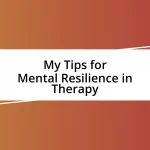Key takeaways:
- Resilience involves not only enduring adversity but also growing and evolving through challenges, as illustrated by both fictional characters and real-life experiences.
- Emotional honesty, adaptability, and community support are crucial traits that enhance resilience, fostering personal development and deeper connections with others.
- Engaging in practices like journaling and setting achievable goals can help cultivate resilience in our own lives, transforming challenges into opportunities for growth.
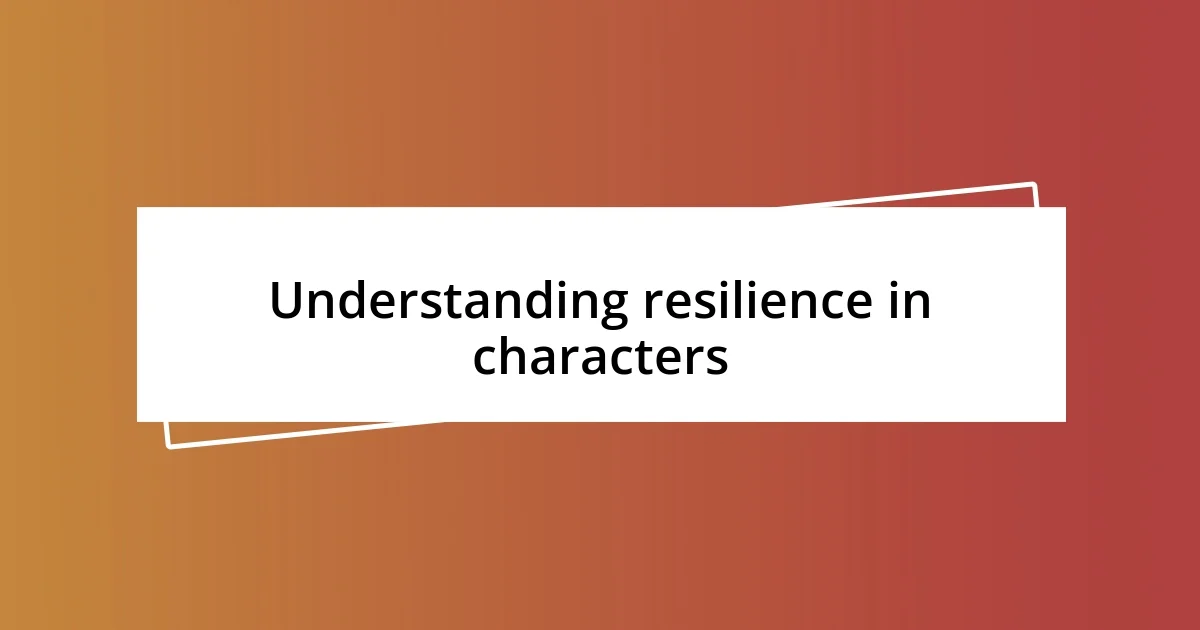
Understanding resilience in characters
Resilience in characters is a fascinating trait that goes beyond mere survival; it’s about growth and transformation in the face of adversity. I remember reading about a character who lost everything but chose to rebuild her life from the ground up. This journey not only showcased her determination but also made me reflect: what would I do in a similar situation?
When I think of resilience, I often consider the emotional rollercoaster these characters experience. They don’t just bounce back; they learn from their struggles. This idea resonates with me—have you ever faced a challenge that reshaped how you see the world? For instance, a prominent character I admire dealt with loss and emerged stronger, showing that resilience often involves embracing vulnerability.
It’s also intriguing how resilience can manifest in various ways, influenced by a character’s background and experiences. I think about a recent story where a timid character unexpectedly rises to the occasion. It made me ponder how many walls we build around ourselves, and what it truly takes to break through them. For me, these moments in literature remind us that resilience is not just about enduring; it’s about evolving.
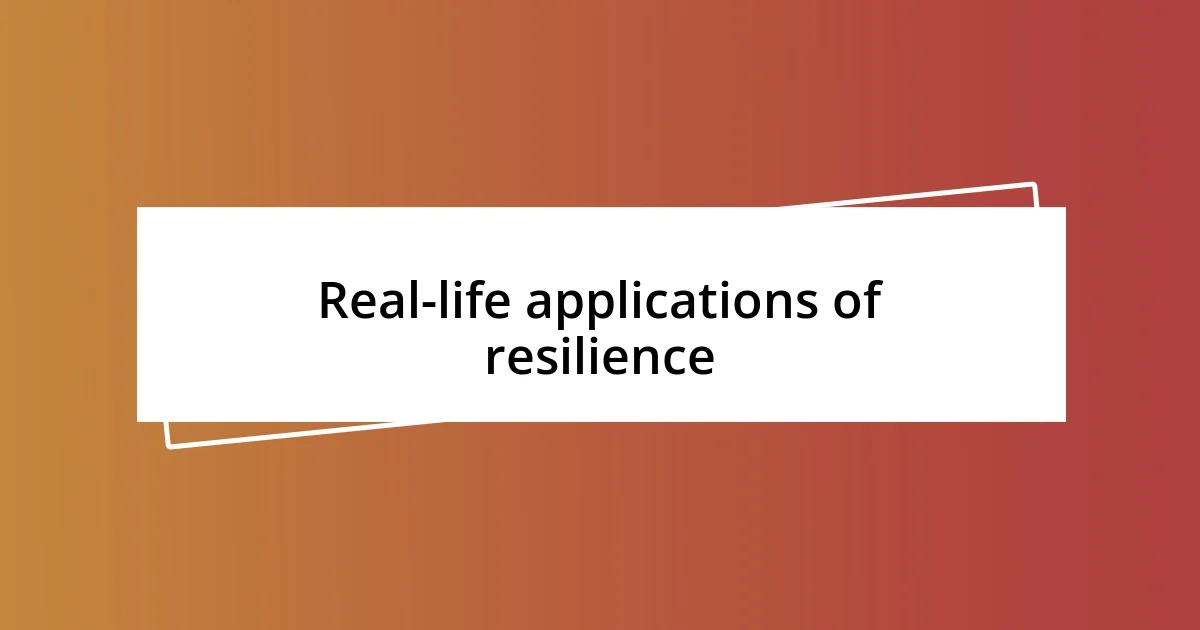
Real-life applications of resilience
Resilience in real life is profoundly applicable, especially in times of personal or professional crises. I recall a time when I faced a significant career setback. Initially, it felt overwhelming, but I gradually learned to view it as an opportunity for growth. Instead of retreating into despair, I focused on developing new skills that ultimately led me to a more fulfilling path. This experience taught me that resilience is not just an innate quality; it’s something we can cultivate actively.
In addition, I’ve seen resilience play out in community settings. During a local disaster, friends and neighbors banded together to support one another, turning a challenging situation into a collective triumph. Witnessing that camaraderie was inspiring. It reinforced my belief that resilience often stems from our relationships with others. Together, we can bounce back stronger, sharing the emotional load and fostering a sense of unity.
It’s also fascinating how resilience can influence our daily choices. I started practicing mindfulness, which taught me to stay grounded during stressful moments. This simple change allowed me to approach challenges with a clearer mind. Isn’t it incredible how small but intentional practices can enhance our resilience? After all, the power to persevere often lies in the habits we form.
| Scenario | Application of Resilience |
|---|---|
| Career Setback | Learning new skills and embracing growth |
| Community Disaster | Shared support and collective triumph |
| Mindfulness Practice | Staying grounded and enhancing emotional clarity |
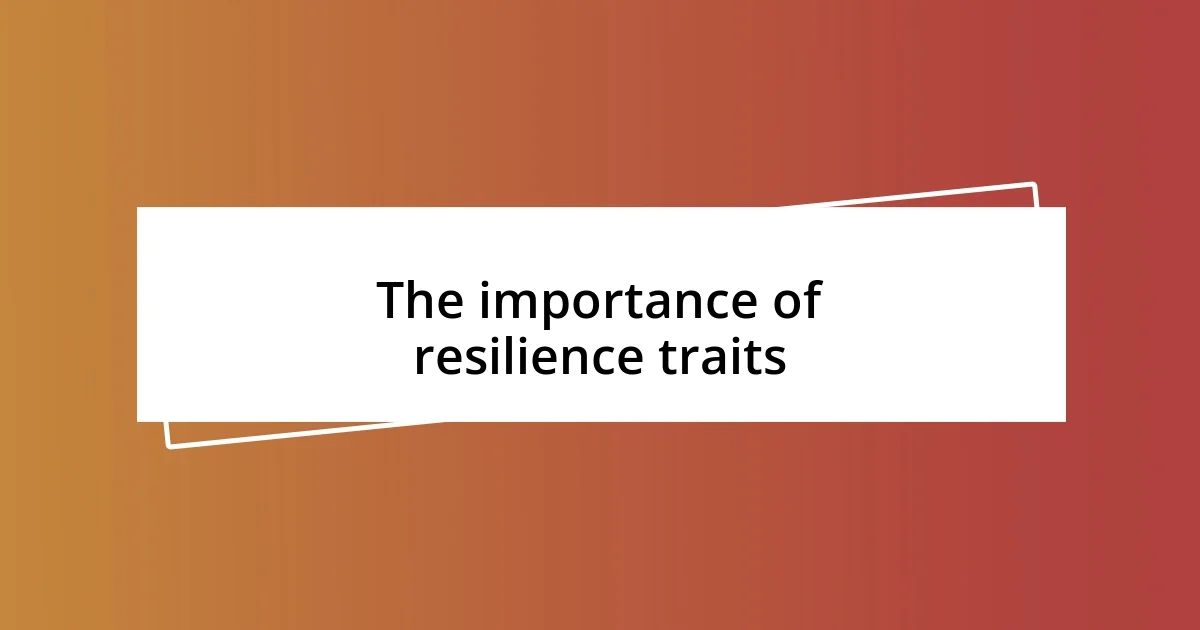
The importance of resilience traits
Resilience traits are essential not only in literature but also in our everyday lives. I can recall a challenging period when I had to adapt to an entirely new city. The loneliness at first felt isolating, but it pushed me to explore my surroundings and connect with others. Through that experience, I learned that resilience isn’t just about enduring tough times; it’s about actively seeking personal growth and forging connections that enrich our lives.
Here’s why resilience is so important:
- Adaptability: Resilient individuals can adjust to change and uncertainty, which fosters growth.
- Emotional Strength: They build emotional resources that help them navigate life’s ups and downs.
- Problem-Solving: Resilience equips people with skills to tackle challenges, turning potential setbacks into learning experiences.
- Positive Outlook: Having a resilient mindset encourages optimism, helping to create a more fulfilling life.
- Community Bonds: Resilience often strengthens relationships, as we learn to rely on and support one another during difficult times.
When I reflect on these traits, I see how they’ve been pivotal in reshaping my life. I remember feeling overwhelmed by a considerable project at work, yet through resilience, I found ways to break it down into manageable tasks. With each small victory, my confidence grew, demonstrating how resilience can propel us forward, even in the face of daunting challenges. Resilience transforms struggles into stepping stones for personal and communal triumphs, deepening our connections to ourselves and others.

Examining modern resilient characters
When I dive into the world of modern resilient characters, I’m often struck by their complexity. I remember watching a movie where the protagonist faced a heart-wrenching loss. Instead of simply mourning, they channeled their pain into creating something meaningful. This response resonated with me on a personal level. Isn’t it fascinating how some characters can transform their tragedies into catalysts for change? It not only highlights their resilience but also inspires us to reflect on how we can leverage our own struggles.
Let’s consider a few beloved literary heroes. I think about the times I’ve connected with characters who faced societal injustice yet stood firm, rallying others to join their cause. Their strength reminded me of moments where I felt overwhelmed by issues around me, yet I chose to voice out, even just in my circle. This ability to confront external challenges while maintaining inner strength is what makes these modern resilient characters so compelling. It makes me wonder, how many of us harness that kind of courage in our real lives?
My admiration for these characters deepens when I see their vulnerability intertwined with resilience. There was a novel where the lead showed not just strength but moments of doubt and vulnerability. This combination made them feel authentic and relatable. Reflecting on my own life, I’ve experienced similar situations where admitting my struggles opened up spaces for growth and connection. Why do we often feel the need to mask our vulnerabilities? What if, instead, we embraced them like these characters do? These questions often lead me back to the essence of resilience: it’s not about being invincible but rather an ongoing journey of accepting both the highs and lows of life.
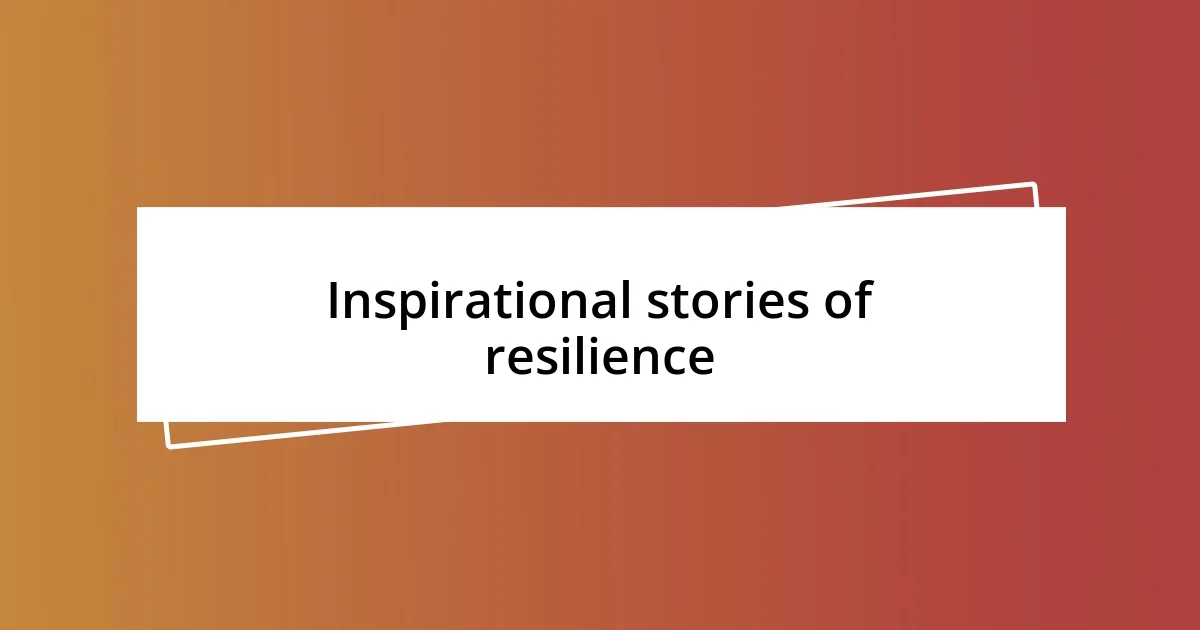
Inspirational stories of resilience
Inspirational stories of resilience often remind us of the power of the human spirit. Take, for instance, an entrepreneur who faced multiple failures before finally launching a successful business. Each setback was met with introspection and renewed determination, demonstrating how resilience turns rejection into redirection. I admire this journey because it emphasizes that the path to success is rarely linear.
I also think about athletes who have overcome physical injuries to achieve greatness. There’s a story I remember fondly: a marathon runner who lost a leg in an accident but went on to become a champion in para-athletics. Her tenacity not only inspired me but also made me question my own thresholds for perseverance. Isn’t it incredible how someone can turn an unimaginable setback into a powerful motivation to succeed?
Then there are those stories of individuals who have faced and triumphed over adversity in their personal lives. Recently, I learned about a young artist who used her struggles with anxiety as a centerpiece for her work. Through her art, she revealed her vulnerabilities, creating a connection with many who felt the same. I can’t help but feel that her story resonates deeply with a trend in today’s society: isn’t it time we celebrate not just our triumphs, but also our challenges? By sharing these narratives, we not only inspire others but also create a community rooted in understanding and resilience.
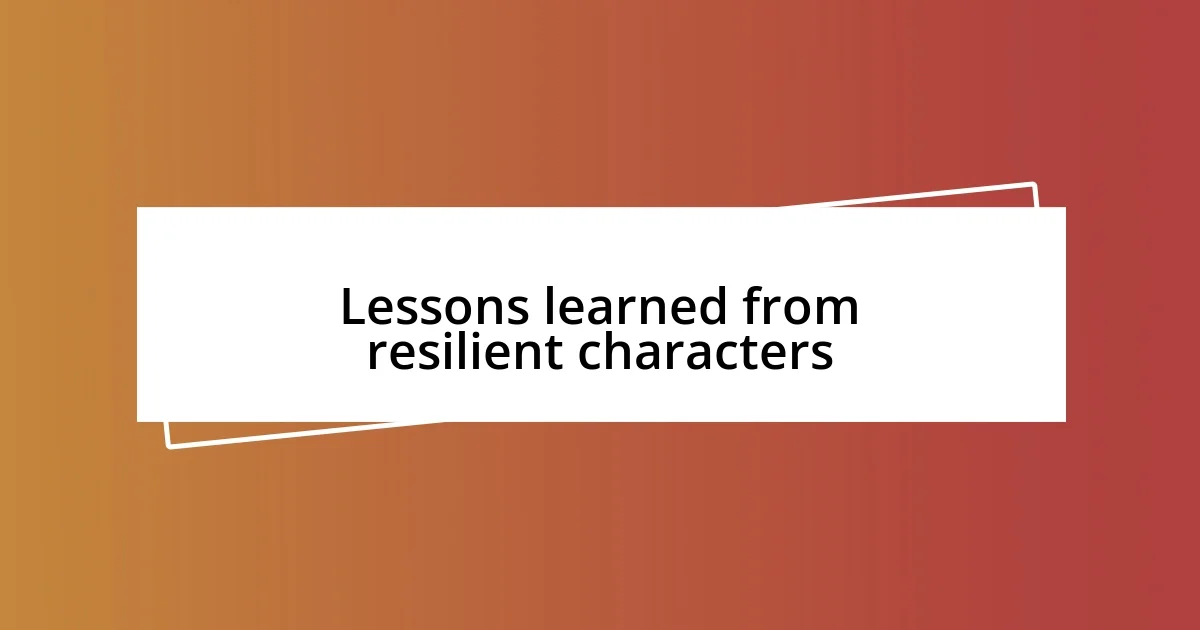
Lessons learned from resilient characters
Resilient characters often teach us valuable lessons about perspective. I remember a series where the central character faced repeated betrayals, yet instead of succumbing to bitterness, they chose to foster forgiveness. This made me think: how often do we hold onto grudges instead of freeing ourselves? Witnessing their journey prompted me to reflect on my own relationships and consider whether I might benefit from a similar approach to forgiveness.
Another lesson from these characters is the importance of adaptability. I think of a story involving a scientist who encountered numerous failed experiments. Rather than seeing failures as dead ends, they viewed them as opportunities to learn and pivot their approach. This mindset resonated with me during my career when a project didn’t go as planned. Instead of feeling defeated, I adopted a “What can I learn from this?” mentality, reshaping my path forward. Isn’t that the essence of true resilience—being willing to evolve and grow, no matter the setbacks?
Emotional honesty is a hallmark of the most relatable resilient characters. There was a memoir about a woman navigating chronic illness while still striving for her dreams. As she revealed her struggles, I felt a kinship with her battles, leading me to acknowledge my own vulnerabilities more openly. How often do we rush to hide our challenges, thinking it’s a sign of weakness? I believe resilient characters show us that embracing our truth—both the good and the difficult—might just be the most empowering choice we can make.
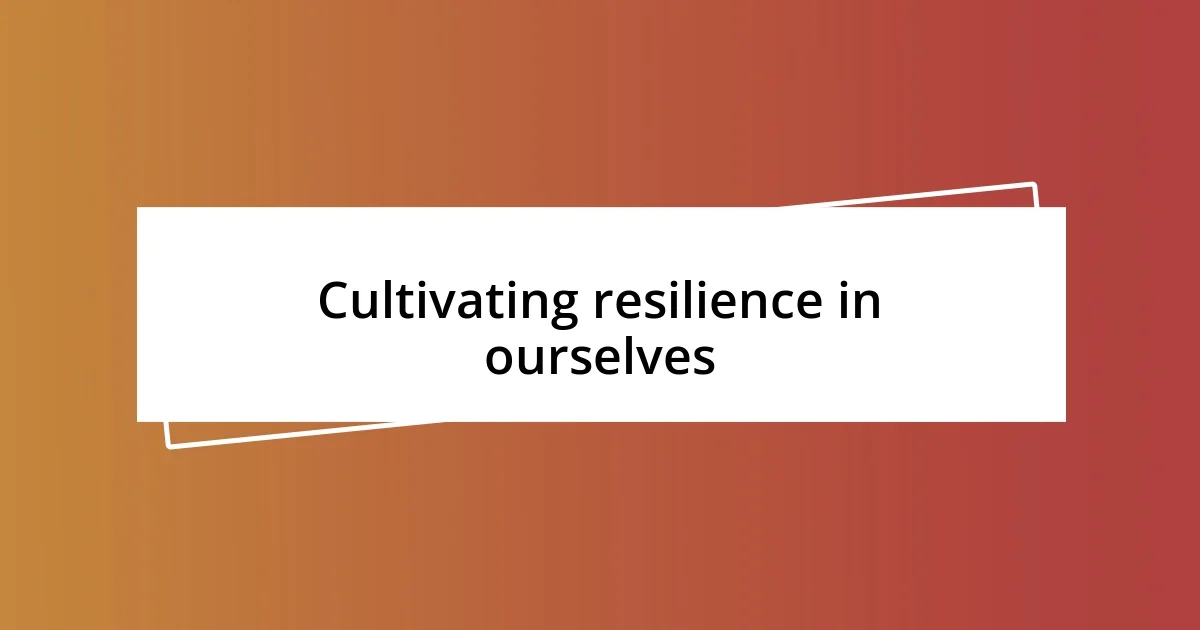
Cultivating resilience in ourselves
Cultivating resilience in ourselves is a journey I’ve found to be incredibly personal and impactful. I remember a time in my life when everything seemed overwhelming—work stress, personal conflicts, and uncertainty about my future weighed heavily on me. During that tough period, I started journaling to process my thoughts and feelings. This simple practice became my lifeline, helping me to confront my challenges rather than avoid them. Isn’t it amazing how something as straightforward as writing can shift our perspective on adversity?
As I continued to explore resilience, I realized the power of setting small, achievable goals. There was a phase when I was training for a half-marathon; I focused on running just a little farther each week. Each small success built my confidence and taught me that progress isn’t always about grand victories, but often about taking one step at a time. Have you ever found yourself in a similar situation? Sometimes those tiny milestones can lead to extraordinary changes in our mindset.
Moreover, surrounding myself with a supportive community has profoundly influenced my resilience. I once joined a support group where sharing our stories and struggles created a safe space for vulnerability and growth. Hearing others’ triumphs over adversity inspired me to tackle my own challenges with renewed vigor. It made me reflect: how often do we underestimate the value of connection in our journey toward resilience? I believe that building a network of encouragement can truly foster a resilient spirit within us all.


